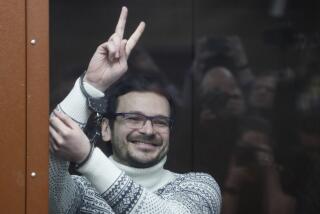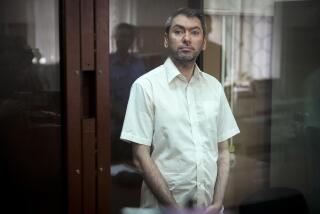Risky Game
- Share via
These are interesting days for longtime Soviet-watchers in the West. The return to Moscow of dissident scientist Andrei D. Sakharov from forced exile in Gorky was big news in itself. But what’s really intriguing is the way Sakharov is being allowed to speak his mind on some very sensitive subjects--that, and unconfirmed reports that thousands more political prisoners may be freed in 1987.
Sakharov got the news of his release from exile in a phone call from Soviet leader Mikhail S. Gorbachev himself. The 65-year-old physicist has indicated that he will henceforth play a less active role in the dissident movement of which he was a leading figure before being carted off to Gorky seven years ago. In interviews with Western newsmen, however, he has mixed praise of Gorbachev’s policy of “openness” and the release of some political prisoners with renewed criticism of Kremlin policies.
Within moments of stepping off the train in Moscow last month, Sakharov publicly observed that “many people remain in terrible, inhuman conditions in camps and prisons.” He also renewed his call for a “fast withdrawal of Soviet forces from Afghanistan.” A few days later he criticized the Soviet government’s negotiating posture in the strategic-arms-control talks--specifically Gorbachev’s insistence on restraints on President Reagan’s “Star Wars” program as a precondition for agreement on missile cuts.
Far from cracking down on the country’s most famous dissident, Soviet authorities allowed American TV networks to use state-run television facilities for interviews with Sakharov and for transmission of his critical comments to audiences in the United States.
It is important to remember that, while Sakharov is free, most Soviet political prisoners remain incarcerated. Restraints on writers, artists and film makers are being eased, and Soviet newspapers are publishing things that would never have seen print even a year ago--but freedom of expression goes only as far as suits the Kremlin’s purposes. Sakharov’s critical comments were censored out of the Soviet media for home consumption.
Sakharov’s release and gentle treatment can be attributed in part to Moscow’s desire to enhance its human-rights image abroad and to build support for Soviet arms-control proposals. This interpretation is bolstered by the fact that official comments on his release came from the Foreign Ministry. But cool-eyed Western analysts believe that more is involved.
Marshall I. Goldman of Harvard’s Russian Research Center, among others, believes that Gorbachev saw Sakharov’s release as an essential step toward enlisting the help of scientists and other intellectuals in his economic-reform movement. It also fits into the campaign to persuade talented Soviet emigres to return home.
If such speculation is well founded, it is hard to escape the conclusion that Gorbachev is playing a risky game from the standpoint of internal Soviet politics. His economic-reform campaign, though of limited scope, has already stirred opposition from bureaucrats and party officials. It was change-resistant folk of this sort who engineered the removal of Nikita S. Khrushchev in 1964. The same thing could happen to Gorbachev if the loosening of ideological controls were to unleash the forces of instability, as former U.S. national-security adviser Zbigniew Brzezinski believes might happen.
At this point, however, all is conjecture. Sakharov’s posture could serve as a model for the rest of us--to be grateful that Gorbachev is displaying a humane streak while remembering that the Kremlin’s machinery of oppression is still very much in place.
More to Read
Sign up for Essential California
The most important California stories and recommendations in your inbox every morning.
You may occasionally receive promotional content from the Los Angeles Times.










